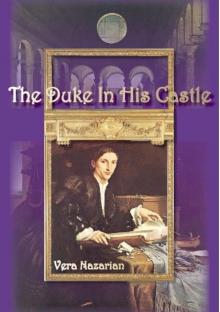- Home
- Vera Nazarian
Northanger Abbey and Angels and Dragons Page 13
Northanger Abbey and Angels and Dragons Read online
Page 13
As they entered Argyle Buildings, however, she was roused by this address from her companion, “Who is that girl who looked at you so hard as she went by?”
“Who? Where?”
“On the right—she is almost out of sight now.”
Catherine looked round and saw Miss Tilney leaning on her brother’s arm, walking slowly down the street. She saw them both looking back at her!
“Stop, stop, Mr. Thorpe,” she impatiently cried; “it is Miss Tilney! How could you tell me they were gone? Stop, stop, I will get out this moment and go to them.”
But Thorpe only lashed his horse into a brisker trot. The Tilneys, who had soon ceased to look after her, were in a moment out of sight round the corner of Laura Place.
During the length of several streets, Catherine entreated him continually to stop. But Mr. Thorpe only laughed in a subdued roar, smacked his whip, encouraged his horse, made odd noises even for an ogre, and drove on. Catherine, angry and vexed, had no means of escape, and was obliged to give up.
Her reproaches, however, were not spared. “How could you deceive me so, Mr. Thorpe? How could you say that you saw them driving up the Lansdown Road? I would not have had it happen so for the world. They must think it so strange, so rude of me! To go by them, too, without saying a word! You do not know how vexed I am; I shall have no pleasure at Clifton, nor in anything else. I would ten thousand times rather get out and walk back to them! How could you say you saw them driving out in a phaeton?”
Thorpe defended himself very stoutly, declared he had never seen two men so much alike in his life.
But now their drive was entirely disagreeable. Catherine listened reluctantly, and her replies were short. Blaize Castle remained her only comfort towards which she still looked with pleasure. Though, she would willingly have given up all its imagined delights—a long suite of lofty rooms, the remains of magnificent furniture, for many years deserted; narrow, winding vaults; low, grated doors; even having their only lamp extinguished by a sudden gust of wind, and being left in total darkness—eschew all of this to regain the Tilneys’ approbation.
In the meanwhile, they proceeded on their journey, and were within view of the town of Keynsham, when a halloo from Morland behind them, made Thorpe pull up.
Morland said, “We had better go back, Thorpe; it is too late to go on today; your sister thinks so as well. We have been exactly an hour coming from Pulteney Street, little more than seven miles, with at least eight more to go. We set out too late. Best to put it off till another day, and turn round.”
“It is all one to me,” bellowed Thorpe rather angrily; and instantly turning his horse, they were on their way back to Bath.
“If your brother had not got such a d——d beast to drive,” said he in a blast of heat, “we might have done it very well. My horse would have trotted to Clifton within the hour. Morland is a fool for not keeping a horse and gig of his own.”
“No, he is not,” said Catherine warmly (while the angels rejoiced), “for I am sure he could not afford it.”
“And why cannot he afford it?”
“Because he has not money enough.”
“And whose fault is that?”
“Nobody’s, that I know of.”
Thorpe then said something in his usual loud, incoherent roar, about its being a d—— thing to be miserly; that if people who rolled in money could not afford things, he did not know who could, which Catherine did not even endeavour to understand. Indeed, she was beginning to wonder if he were rather out of his mind from all the preoccupation with treasure and henceforth, money and costs and being able to afford or not afford things—
Furthermore, deprived of her only remaining consolation, Blaize Castle, Catherine was even less disposed to be agreeable. And they returned to Pulteney Street without her speaking twenty words.
As she entered the house, the footman told her that a gentleman and lady had called and inquired for her a few minutes after her setting off. When he told them she was gone out with Mr. Thorpe, the lady had asked whether any message had been left for her. On his saying no, she did not leave a card.
Pondering over these heart-rending tidings, Catherine walked slowly upstairs, accompanied by tender consolatory firefly lights of the angels. She was met by Mr. Allen, who said, “I am glad your brother had the sense to have you all come back. It was a strange, wild scheme.”
They all spent the evening together at Thorpe’s. Catherine was disturbed and out of spirits.
But Isabella seemed to find private partnership with Morland a very good equivalent for the quiet country air of Clifton, and satisfaction in not being at the Lower Rooms.
“How I pity the poor creatures that are going there! How glad I am that I am not amongst them! I wonder whether it will be a full ball or not!” And Isabella went on delightfully to charge James with longing to attend—no one here was preventing him!—in the shrillest and yet most dulcet tones imaginable.
Catherine could have accused Isabella in turn, of being wanting in sympathies towards herself and her sorrows. But then, oh dear, whatever was she expecting? This was a heartless naphil!
Why was it so easy for Catherine to forget all the time? Prehaps it was indeed a supernaturally difficult matter to maintain this clear true vision, to unwaveringly continue to see Isabella’s true inner self. Was Catherine faltering in her sight? Or was she simply unwilling to continuously think ill of someone she knew as a friend, for the first time in her life?
“Oh, do not be so dull, my dearest creature,” Isabella whispered meanwhile. “You will quite break my heart. It was amazingly shocking, to be sure; but the Tilneys were entirely to blame. Why were not they more punctual? It was dirty, but I am sure John and I should not have minded it for the sake of dear friends. Oh! Good heavens! What a delightful hand of cards you have got!”
Catherine was out and away from their residence well before midnight, once again cleverly avoiding any horrible encounter with not one but two nephilim guardian demons.
But at Pulteney Street, the only thing awaiting our heroine was the sleepless couch—the true heroine’s portion—and a pillow strewed with thorns and, possibly, wet with tears . . .
Oh, for heaven’s sake! In truth, there were no thorns, but a goodly number of angels who perched in the curtains and on the dresser, and softly sang our entirely tearless heroine into a sound sleep.
Chapter 12
“Mrs. Allen,” said Catherine the next morning, “will there be any harm in my calling on Miss Tilney today? I shall not be easy till I have explained everything.”
“Go, by all means, my dear; only put on a white gown; Miss Tilney always wears white. Also, Mrs. Hughes says that white muslin is also a clue to that hidden treasure—at least according to Lady Raleigh, who was informed by Mrs. Sands—”
Catherine cheerfully complied, and being properly equipped, hurried to be at the pump-room, in order to ascertain General Tilney’s lodgings.
To Milsom Street she was directed, and hastened away with an eager beating heart to pay her visit, explain her conduct, and be forgiven. She practically flew through the church-yard, resolutely turning away her eyes so as not to be obliged to see her beloved Isabella and her dear family, freezing a shop nearby.
She reached the house without any impediment, looked at the number, knocked at the door, and inquired for Miss Tilney.
She was told Miss Tilney might be at home. Would she be pleased to send up her name? She gave her card.
In a few minutes the servant returned, with a strange look and said he had been mistaken—Miss Tilney was out.
Catherine left, with a blush of mortification. She felt almost certain that Miss Tilney was at home, but too much offended to admit her.
As she retired down the street, she looked back at the house. And then she saw Miss Tilney herself issuing from the door, followed by a gentleman, whom Catherine believed to be her father. They turned up towards Edgar’s Buildings.
Catherine, in deep mortifi
cation, proceeded on her way. She was almost angry herself at such incivility; but checked her resentment, aware only of her own profound ignorance of the laws of worldly politeness.
“Take heart, dear child! Courage!” the angels whispered.
Dejected and humbled, she considered not going with the others to the theatre that night, but soon recollected there was no real excuse for staying at home. And, besides, it was a play she wanted very much to see.
To the theatre accordingly they all went. No Tilneys appeared to plague or please her, only crowds of theatre-goers all speaking rather volubly of secret clues and hidden treasure.
Oh dear, thought Catherine.
In addition, she feared that, amongst the many perfections of the Tilney family, a fondness for plays was not to be ranked. Perhaps it was because they were used to the finer performances of the London stage, which—on Isabella’s authority—rendered everything else of the kind “quite horrid”—though, not in the delightful Udolpho sense.
Catherine was not deceived in her own expectation of pleasure. Indeed, the theatre was a wonder, and oh! there were so many angels! As thousands of golden candle flames they floated in the dark expanse over everyone’s heads, even after the lights dimmed—a heavenly wonder to which no one but Catherine was witness. And the comedy itself so well suspended her care that no one, observing her during the first four acts, would have supposed she had any wretchedness about her.
On the beginning of the fifth, however, the sudden view of Mr. Henry Tilney and his father, joining a party in the opposite box, recalled her to anxiety and distress.
The stage could no longer excite genuine merriment or keep her whole attention. Every other look was directed towards the opposite box. For the space of two entire scenes, she thus watched Henry Tilney, without being once able to catch his eye.
No longer could he be suspected of indifference for a play. His notice was never withdrawn from the stage during two whole scenes.
At length, however, he did look towards her, and he bowed—but such a bow! No smile, no continued observance attended it. His eyes immediately turned away.
Catherine was restlessly miserable. She almost ran to his box and forced him to hear her out. Feelings rather un-heroic possessed her. Instead of considering her own dignity injured, proudly resolving to show her resentment, leaving him to seek her, and meanwhile flirting with somebody else—she took upon herself all the shame of apparent misconduct, eager only for an opportunity to offer an explanation.
The play concluded—the curtain fell—Henry Tilney was no longer to be seen where he had hitherto sat. But his father remained.
Perhaps he might be now coming round to their box? Good heavens! She was right! In a few minutes he appeared, and, making his way through the thinning rows, spoke with calm politeness to Mrs. Allen and her young friend.
Not with such calmness was he answered by the latter: “Oh! Mr. Tilney, I have been quite wild to speak to you, and make my apologies. You must have thought me so rude! But indeed it was not my own fault, was it, Mrs. Allen? Did not they tell me that Mr. Tilney and his sister were gone out in a phaeton together? And then what could I do? But I had ten thousand times rather have been with you; now had not I, Mrs. Allen?”
“My dear, you tumble my gown,” was Mrs. Allen’s reply.
Her assurance, however, was not thrown away. It brought a more cordial, natural smile into his countenance, and Mr. Tilney replied in a tone which retained only a little affected reserve: “We were much obliged to you at any rate for wishing us a pleasant walk after our passing you in Argyle Street: you were so kind as to look back on purpose.”
“But indeed I did not wish you a pleasant walk! I never thought of such a thing; but I begged Mr. Thorpe so earnestly to stop! I called out to him as soon as I saw you! And, if Mr. Thorpe would only have stopped, I would have jumped out and run after you!”
Is there a Henry in the world who could be insensible to such a declaration? Is there indeed an angel who could be?
Henry Tilney at least was not. With a yet sweeter smile, he said everything that need be said of his sister’s concern, regret, and dependence on Catherine’s honour.
“Oh! Do not say Miss Tilney was not angry,” cried Catherine, “because I know she was; for she would not see me this morning when I called. I saw her walk out of the house the next minute after my leaving it! I was hurt, but I was not affronted. Perhaps you did not know I had been there.”
“I was not within at the time. But I heard of it from Eleanor, and she has been wishing ever since to see you, to explain. It was nothing more than that my father made a point of her being denied—they were just preparing to walk out, and he was hurried for time. That was all, I assure you. She was very much vexed, and meant to make her apology as soon as possible.”
Catherine’s mind was greatly eased by this information. Yet she could not help the following artless question, rather distressing to the gentleman: “But, Mr. Tilney, why were you less generous than your sister? If she felt such confidence in my good intentions, and could suppose it to be only a mistake, why should you be so ready to take offence?”
“Me! I take offence!”
“Nay, I am sure by your look, when you came into the box, you were angry.”
“I angry! I could have no right.”
“Well, nobody would have thought you had no right who saw your face.”
He replied by asking her to make room for him, and talking of the play. Their angels radiantly mingled overhead, then settled about gently among the folds of their clothing.
Mr. Tilney remained with them some time, and was only too agreeable for Catherine to be contented when he went away. Before they parted, however, it was agreed that their missed walk should be taken as soon as possible. And, setting aside the misery of his quitting their box, she was left one of the happiest creatures in the world.
While still talking to Mr. Tilney, she had observed with some surprise that John Thorpe—who was never in the same part of the house for ten minutes together, and was heard bellowing all about the theatre, either about “little wee Orphans of the Rhine,” or “in the Rye,” or herds of cows, or possibly cow bells around Mrs. Clermont’s neck, in some midnight black forest, or possibly in a black dress—was now engaged in conversation with General Tilney.
Catherine felt more than surprise when she thought herself the object of their attention and discourse. What could they have to say of her?
She feared General Tilney did not like her appearance. Surely it was implied in his preventing her admittance to his daughter, rather than postpone his own walk a few minutes.
“How came Mr. Thorpe to know your father?” was her anxious inquiry, as she pointed them out to her companion.
Mr. Tilney knew nothing about it. But his father, like every military man, had a very large acquaintance, and that included, no doubt, some lumbering infernal gentlemen.
When the entertainment was over, Thorpe came to scorch the premises in their vicinity and assist them in getting out, causing at least two mirages to appear in the hallway—one of a kneeling footman, and the other of a portly dowager with tall ostrich feathers in her hat—both of which elicited gasps from occasional persons walking around and once through them, until the hot air was sufficiently dissipated.
Catherine was the immediate object of his gallantry. And, while they waited in the sweltering lobby for a chair, he prevented her unvoiced inquiry by asking, in a consequential manner, whether she had seen him talking with General Tilney: “He is a fine old fellow, upon my soul! Stout as a dragon, active—looks as young as his son. I have a great regard for him, I assure you: a gentleman-like, good sort of fellow as ever lived.”
“But how came you to know him?” asked Catherine, fanning herself as rapidly as possible in the usual heat.
“Know him! There are few people much about town that I do not know. Indeed, likely there are none! I have met him forever at the Bedford; and I knew his face again today the momen
t he came into the billiard-room. One of the best players we have, by the by; and we had a little touch together, though I was almost afraid of him at first: the odds were five to four against me; and, if I had not made one of the cleanest strokes that perhaps ever was made in this world—” Thorpe rambled on at length about billiards, then concluded, “However, I did beat him. A very fine fellow; as rich as Croesus. I should like to dine with him; I dare say he gives famous dinners. But what do you think we have been talking of? You. Yes, by heavens! And the general thinks you the finest girl in Bath.”
“Oh! Nonsense! How can you say so?”
“And what do you think I said?”—lowering his voice—“well done, general, said I; I am quite of your mind.”
Here Catherine, who was much less gratified by his admiration than by General Tilney’s, was not sorry to be called away by Mr. Allen. It was getting rather late, dangerously close to midnight, and she truly did not want to meet Thorpe’s demon.
Thorpe, however, would see her to her chair, and, till she entered it, continued roaring the same kind of delicate mutton flattery, in spite of her entreating him to desist.
That General Tilney, instead of disliking, should admire her, was very delightful. And she joyfully thought that there was not one of the family whom she need now fear to meet.
The evening had done much more for her than expected.
Unfortunately in that moment from the distant bell tower sounded the Midnight Bell.
And there was Thorpe’s demon, solidifying from his lumbering shadow like an evil genie detaching itself from a potbellied bottle. . . .
Standing up, it leered at her—twice the size of Isabella’s own fiend, and twice as putrid. Its horns were bullish; its eyes were crimson-red infernal coals, burning with such heat that Catherine might have had to take a step back, had she not been safely ensconced in the chair, about to embark home.
The demon muttered something filthy in her wake. Catherine shuddered—for once she was truly glad that her loyal angels never for a moment left her side.

 Cobweb Bride
Cobweb Bride Survive
Survive![[Atlantis Grail 01.0] Qualify Read online](http://i1.bookreadfree.com/11/atlantis_grail_01_0_qualify_preview.jpg) [Atlantis Grail 01.0] Qualify
[Atlantis Grail 01.0] Qualify Lords of Rainbow
Lords of Rainbow Cobweb Forest (Cobweb Bride Trilogy)
Cobweb Forest (Cobweb Bride Trilogy) Compete
Compete Cobweb Empire
Cobweb Empire Northanger Abbey and Angels and Dragons
Northanger Abbey and Angels and Dragons Dreams of the Compass Rose
Dreams of the Compass Rose Win
Win The Clock King and the Queen of the Hourglass
The Clock King and the Queen of the Hourglass The Duke In His Castle
The Duke In His Castle Old Farts
Old Farts